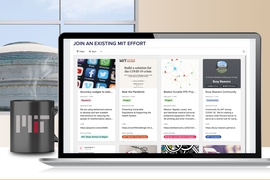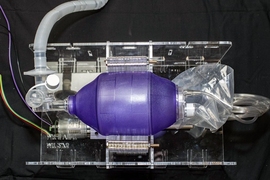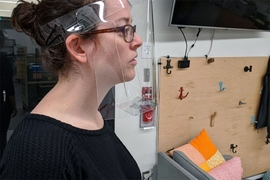Innovation and entrepreneurship aren’t easy. New companies are forced to make due with minimal resources. Decisions must be made in the face of great uncertainty. Conditions change rapidly.
Perhaps unsurprisingly then, MIT’s I&E community has stepped up to the unforeseen challenges of the Covid-19 pandemic. Groups from many corners of the Institute are adapting to the myriad disruptions brought on by the emergency and spearheading efforts to help the people most affected.
At a time when most students would be on spring break, many were collaborating on projects and participating in hacking workshops to respond to Covid-19. And as faculty and staff develop new curricula and support structures, they’re focusing on the needs of their students with the same devotion entrepreneurs must focus on their customers.
Above all, members of the MIT community have treated the challenges presented by Covid-19 as opportunities to help. Perhaps nowhere is that more apparent than the Covid-19 Rapid Innovation Dashboard, which was just a rough idea as recently as March 16, but is now a bustling hub of MIT’s Covid-19-related activities. Projects on the dashboard include an initiative to help low-income K-12 students with school shutdowns, an effort leveraging behavioral science to reduce the spread of misinformation about the virus, and multiple projects aimed at improving access to ventilators.
People following those projects would hardly suspect the participants have been uprooted from their lives and forced to radically change the way they work.
“We never would’ve wished this on anybody, but I feel like we’re ready for it,” says Bill Aulet, the managing director of the Martin Trust Center for MIT Entrepreneurship and a professor of the practice at MIT’s Sloan School of Management. “Working in an environment of great change, if you’re a great entrepreneur, is playing to your strengths. I think the students will rise to the occasion, and that’s what we’re seeing now.”
The Rapid Innovation Dashboard
In the second week of March, as the global consequences of Covid-19’s spread were becoming apparent, members of the MIT Innovation Initiative began getting contacted by members of the MIT community looking for ways to help.
Most people wanted information on the various grassroots projects that had sprouted up around campus to address disruptions related to the spread of the virus. Some people were looking for ways to promote their projects and get support.
MITii’s team began brainstorming ways to help fill in those gaps, officially beginning work on the dashboard the week of March 16 — the same time staff members began working remotely.
“From ideation to whiteboarding, to concept, to iteration, to launch, we did it all in real time, and we went from idea to standing the dashboard up in four days,” MITii executive director Gene Keselman says. “It was beautiful for all of us innovation nerds.”
The site launched on March 19 with six projects. Today there are 50 live projects on the site and counting. Some of them deal with mechanical or scientific problems, like the aforementioned efforts to improve access to ventilators, while others are more data-focused, like an initiative to track the spread of the virus at the county level. Still others are oriented toward wellness, like a collection of MIT-related coloring pages for destressing.
“A lot of the things we’re seeing are data-driven, creative-driven projects to get people involved and get them feeling like they’re making an impact,” Keselman says.
The current dashboard is version 1.0 of an ongoing project that will continue to evolve based on the community’s needs. Down the line, the MITii team is considering ways to better connect the MIT community with investors looking to fund projects related to the virus.
“This is going to be a long term problem, and even when we go back to the office, issues will persist, we’ll be dealing with things that are the runoff from Covid-19,” Keselman says. “There will be an opportunity to keep this thing going to solve all kinds of second- or third-order problems.”
Overcoming adversity
The dashboard is just one example of how different entrepreneurial organizations on campus are stepping up to the challenges of Covid-19. The Trust Center is encouraging students to leverage its Orbit app, to get help from entrepreneurs in residence, engage with other members of MIT’s entrepreneurial community, and navigate MIT’s myriad entrepreneurial resources. And in response to Covid-19, the Trust Center launched the Antifragile Entrepreneurship Speaker Series to provide thought leadership to students.
“We’ve revitalized our speaker series,” Aulet says. “We used to fly people in, but now we can have anyone. They’re sitting at home, they’re bored, and we can have more interaction than we did before. We try to create antifragile humans, and antifragile humans excel in times like this.”
MIT D-Lab, where hands-on learning and common makerspaces are central to operations, is just one example of an area where faculty members are taking this opportunity to try new ways of managing projects and rethinking their curriculum.
“We’re in a real brainstorming phase right now, in the best sense of the word — throwing out all the wild ideas that come to us, and entertaining anything as we decide how to move forward,” Libby Hsu, a lecturer and academic program manager at D-Lab, told MIT News the week before MIT classes resumed. “We’re getting ready to ship materials and tools to students at their homes. We’re studying how to use Zoom to facilitate project work student teams have already put in. We’re realistically re-assessing what deliverables we could ask of students to help D-Lab staff prototype things for them here on campus, perhaps later in the semester or over the summer.”
Other entrepreneurial groups on campus, like the Venture Mentoring Service, MIT Sandbox, and the Legatum Center, are similarly adopting virtualized support mechanisms.
On March 5, MIT Solve, which uses social impact challenges to tackle the world’s biggest problems, launched a new Global Challenge seeking innovations around the prevention, detection, and response of Covid-19. The winning team will receive a $10,000 grant to further develop their solution.
The students themselves, of course, are also organizing initiatives. In addition to the student-led projects in the Rapid Innovation Dashboard, student finalists in this year's MIT IDEAS Social Innovation Challenge have leveraged their entrepreneurial experience to help address equipment shortages and assist communities in fulfilling changing food and shelter needs. And a new community initiative, the MIT COVID-19 Challenge, held its first virtual “ideathon” this past weekend, with another major event April 3-5.
Indeed, Keselman could’ve been talking about any group on campus when he said of his team at MITii, “We feel like we lived an entire lifetime in just the last week.”
The early efforts may not have been the way many participants expected to spend their spring break, but in the entrepreneurial world, new challenges are par for the course.
“Being knocked out of your homeostasis is a good thing and a bad thing, and it’s an entrepreneur’s job to make it more of a good thing than a bad thing,” Aulet says. “I think we’ll come out of this utilizing technology to have more efficient, more effective, more inclusive engagements. Is this disrupting the entrepreneurial ecosystem? Absolutely. Should we come out of it stronger? Absolutely.”












